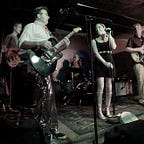Your #Why Doesn’t Matter
“I have to figure out my purpose.”
“I’m struggling to find my ‘why’.”
“I feel like I’m walking through deep sand, lost and with no purpose.”
Many of my friends and clients are in transition, and these are the phrases I hear.
This may be controversial… I think seeking your “why” is overrated, and not particularly helpful in finding happiness and fulfillment. Distilling what you believe down to a basic, clear concept is important in terms of your basic behavior and actions, but when you think about it, your “why” is likely pretty similar to the people you admire and spend time with.
Here’s an example:
I believe that every human has value and can contribute to our global community…
Follow that sentence with anything related to helping people find happiness, and you have a pretty common “why”. The values aren’t cliché; the words just don’t describe you as a unique human. How you apply your “why” matters.
It’s your “what” that is your unique value proposition, not your “why”.
I wrote about finding my “what”, and the lightning bolt I experienced as a result. Discovering my “what” took me directly to my “why”, but that didn’t really change anything.
What changed my perspective, my focus for my work and professional development was that by discovering my “what”, I found my current purpose.
There’s some expectation that when the lightning bolt hits, you’ll suddenly and immediately be able to apply your epiphany to improve your income and happiness… and that’s pretty unlikely. Though I still feel incredibly energized with my discovery, it takes time to figure out how to apply my “what” to my work, and to everything else in my life. Because if you can’t apply your “what” across the spectrum of your life activities, it’s probably not your “what”.
Confused? Here’s my example, my “what”:
This epiphany came suddenly, after some major introspection and discussion with trusted friends, but the “what” itself was building over many years. When I realized this truth about my superpower, I was able to look back on years of RSMs to see the pattern.
There are so many things I’ve been inspired by and interested in, which is part of why finding this was such a challenge. For instance, I’ve been planning and hosting events since I was 12 years old when I planned a crazy surprise party for my little sister. For a little while, I had a catering business, and at one point in my career I was the director of sales at a hotel, planning and hosting events.
That was when I assumed my superpower was event planning and dove deeply into that activity.
One of my favorite projects was working with the Montana University System to build a common course numbering system to facilitate simpler transfer of credits for students from system school to system school. I facilitated meetings of faculty and registrars for two years, and heard comments like this after every meeting: “That was the most productive meeting I’ve ever experienced.”
That was when I decided my superpower was facilitation and dove deeply into that activity.
Our home is a place of comfort for many guests; we don’t just feed people, we nourish them. Over the past 20 years, we’ve had many parties and events in our home, hosted musicians and music jam sessions, and provided solace and comfort to hundreds of guests. At some point:
I assumed my superpower was hospitality and comfort, and dove deeply into those activities.
With my recently uncovered “what” in mind, the pattern emerged.
I was applying this concept all along. My success in planning and hosting events, facilitating meetings, and providing that kind of space in our home was all a result of my superpower — my “what”.
Think back on those times you felt like a rock star; I call those Rock Star Moments (RSMs). I’m talking about specific experiences that left you walking away smiling, knowing you nailed it, and feeling like you really contributed to something greater than yourself. Consider all parts of your life, from very early on, at home, at school, at work, any activity or hobby.
Dig in and write down a phrase or a few sentences to remind you of what happened, who was there, and what you DID, specifically.
Take your time with this exercise. It’s not easy to come up with a list like this. If you are really down, it’s especially hard to find those sparks of light, so ask a few people you trust to share what they believe your super powers are, what experiences they had with you that they thought you really excelled.
Next, as you develop the list (keep adding to it!), start to consider patterns. What is consistent in those experiences? The content or activity itself? The people? The responses of those around you? The impact? What is consistent about what you were providing or doing in those situations?
Start with the exercise here. Create a list of your RSMs. Enlist the help of trusted friends and family. Take your time and be gentle with yourself, and find your pattern.
Find your “what”,
so your “why” and “how” will present themselves.
Originally published at elkinsconsulting.com.
